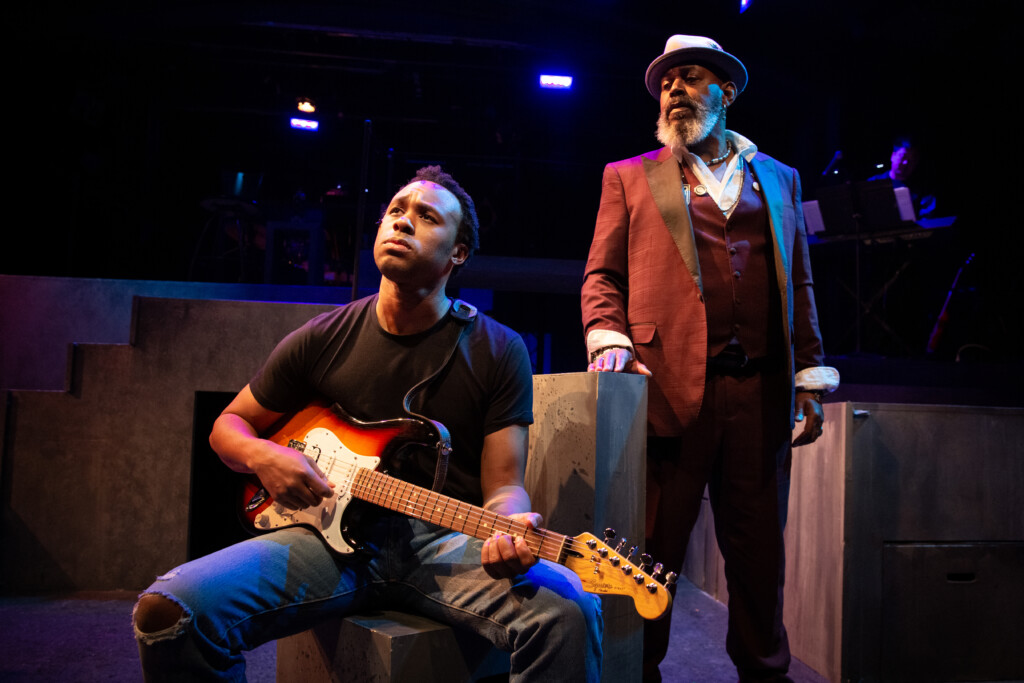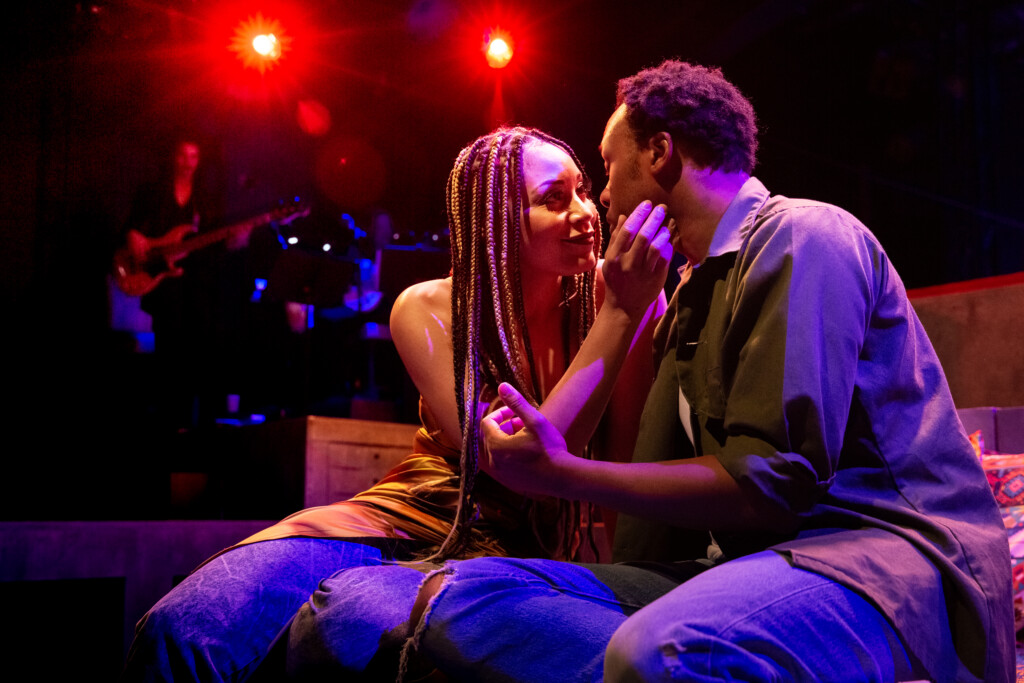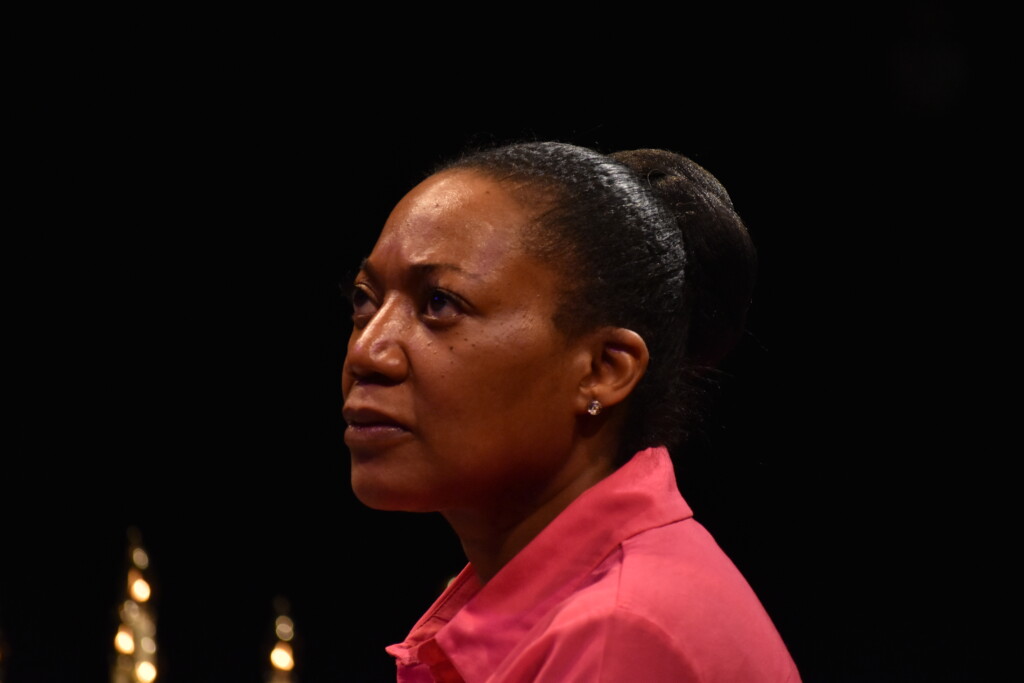SALT LAKE ACTING COMPANY: PASSING STRANGE
Audiences might be well prepared for what the rock opera Jesus Christ Superstar or the Motown soul musical The Wiz have to offer but are they really prepared for Passing Strange, a rock musical, with a nice bit of punk and gospel thrown into the mix, which examines the Black experience in an entirely different way.
At the beginning of the show, the 14-year-old Youth, embodying in part the autobiographical experiences of rock musician and bandleader Stew (Mark Stewart), steps without hesitation into his role as an audacious cosmopolitan explorer. He steadfastly refuses to accept the conventional limits of an imagined authenticity of Blackness or the tidy monolithic, stereotypical expectations of his Black identity. Set in the 1970s and 1980s, the artistic vibes arise from rock, French New Wave cinema, the heady waves of sexual freedom, the rise of punk and late Cold War sociopolitical activism. Casting aside the wishes of his mother and his church which could relegate him to a comfortable, suburban, middle-class life, Youth pursues his rock music dreams on a wild bohemian ride with stops in Amsterdam and Berlin. He swears that he will never return home, relishing in the dreams of other Black expats. Berlin, in particular, has everything that he seems to want, unlike southern California. But, even in Germany, he realizes the limits of pretending to be born of the dissonances and tensions that drove other Black expats to flee their American communities.
Passing Strange, which won a slew of Tony Awards and Drama Desk honors after its Broadway premiere in 2008, significantly shifted and expanded the creative possibilities of musical theater. To add, musicals, in general, are among the most challenging genres for independent theater companies and Passing Strange is complex in its narrative form, music and choreographic elements.
Nevertheless, poised to become one of the greatest moments of Utah theatrical history, the Utah premiere production of Passing Strange, directed by Todd Underwood, scores as a stupendous blockbuster for Salt Lake Acting Company (SLAC). Superb in every measure, this show should not be missed during its run, which continues through May 15.
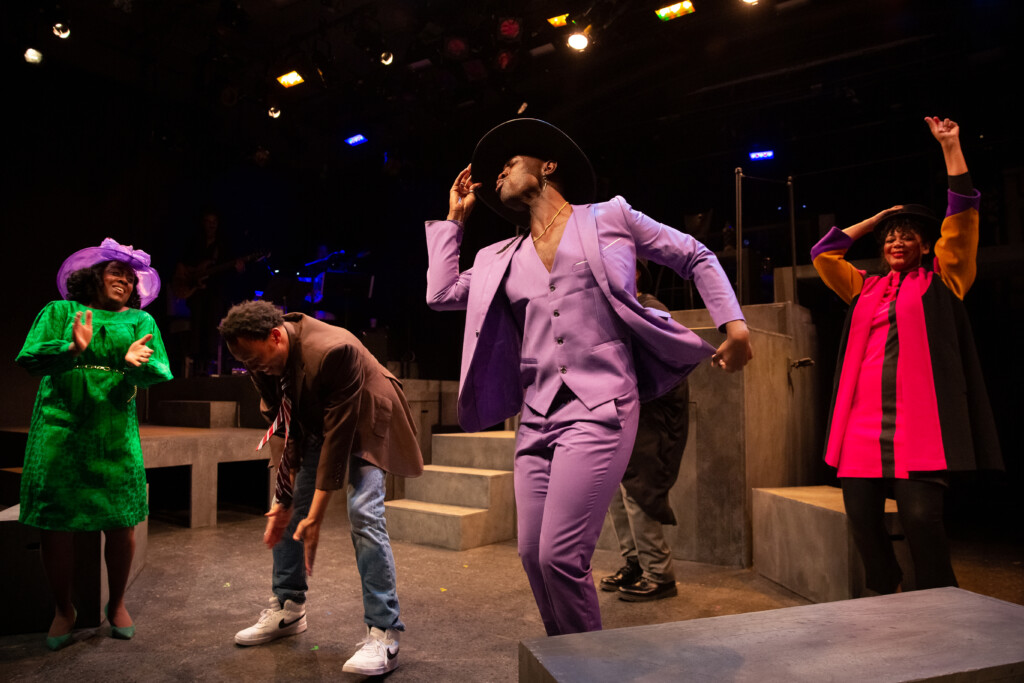
The ensemble chemistry clicks exquisitely in every beat of the show. Carleton Bluford as Youth excels in achieving the extraordinary demands of a character who progresses from the age of 14 to 22. Dee-Dee Darby-Duffin is just as persuasive as his Mother, wondering why her son has decided to swap the comfortable circumstances and expectations of his life in the U.S. for the unpredictable experiences of life as a European exile. Lee Palmer is heavenly as the Narrator, always finding the right pitch and cadence, as he brings the audience to the proper point at whatever the moment of the narration demands. Tour de force performances from the ensemble round out the cast: Latoya Cameron, Kandyce Marie, Brian Kinnard and Jamal A. Shuriah. They move effortlessly from one character to another, as we are collectively transported from one city to another. And, kudos to the onstage musicians who achieved wonderful results in balance with the vocals and served as foils for the occasional break through the fourth wall. Alex Marshall is musical director as well as keyboardist and guitarist. The onstage band features Andres Reyes (guitarist/keyboardist), Zaza Historia VanDyke (bassist) and Wachira Waigwastone (drummer).
Underwood’s direction comes across like an exhilarating love letter to the epiphanies in the musical, which Stew, Heidi Rodewald, and Annie Dorsen wrote. Although SLAC is presenting the Utah premiere, the show’s genesis was nearly 20 years ago in the state, as a preview at The Utah Review cited. It came at the Sundance Institute Theatre Labs in Park City during 2004 and 2005, when Passing Strange received two rounds of creative development — a decision that happens rarely for projects being workshopped here. Passing Strange received its world premiere in Berkeley, California and was later staged Off-Broadway before having its Broadway premiere in 2008. Filmmaker Spike Lee produced and directed a filmed version of the musical, which premiered at Sundance in 2009. This Utah homecoming was anticipated for a long time but this latest production also shows how well the musical has ripened and resonates with even greater relevance now.
Returning to the point about on-stage chemistry, it is notable just how well the cast appear as a tightly knit family of performers. Three of the cast members (Bluford, Darby-Duffin and Cameron) are well known on the Salt Lake City stage and have worked together previously while the remaining four (Kinnard, Marie, Palmer and Shuriah) are making their SLAC debuts. Indeed, there are many individuals in the arts like Youth who see themselves, especially at that same age, as exiles in their own hometowns. For example, Stew remembers that his mother could not understand why her son loved Jimi Hendrix. In the show, Youth tells Mother, “Hendrix had to go [to Europe] to get famous. America can’t handle freaky negros.”
Youth’s story is about personal salvation but his awakening also is as much a product of the memories of home and history as his experiences of going abroad and finally being able to see himself clearly for the first time. The marvelous scene in the first act with the church choir, where Youth reveals, to his mother’s delight, that he finally gets it could not have been played better. Youth’s mother is ecstatic, thinking that her son finally has seen the Spirit but when he tells her that his revelation is that their church music has the same roots as rock ‘n’ roll, she slaps him. Those who have read James Baldwin’s Go Tell It on the Mountain will immediately appreciate the genius of this scene, which is conveyed with utmost clarity in this production. Another outstanding stroke of programming comes before the beginning of the musical, with Wynter Storm’s reading of her original poem Church Gyrl, an outstanding companion piece to Passing Strange and this scene in particular.
In an interview with The Los Angeles Review of Books three years ago, Stew recalled how he read Baldwin’s most famous piece of fiction in high school but its full impact did not register with him until years later when he was helping his daughter with her book report about the novel. After mentioning that he had reread the book, he talked about how it was an experience of “spiritual copyright infringement,” adding, “that book had completely put its stamp on me and I’d had no idea. There were direct things in that book that informed not only my life but that informed Passing Strange.”

The psychic connection embodied within every incredible scene, song and dance in Passing Strange evidently is in the creative bloodstream of every cast member in the SLAC production. This explains why this production has knocked it out of the park for a grand slam. There is a reason why the arts become the essential fount of spirituality, knowledge and enlightenment for every Stew out there as well as for everyone who aspires to be like each stellar member of the cast and production crew responsible for SLAC’s blockbuster gift to the cultural fabric of the Utah community. Art like this is the true proven source of change that can really matter — for those on stage as well as those in the audience whose worldviews will be elevated and transformed by this astonishing evening of entertainment.
Community partners for the production include Curly Me!, a nonprofit dedicated to events and mentor-based program for Black girls, ages 5-14, and the Utah Black Artists Collective (UBLAC), which promotes diversity in the arts by supporting Black artists, musicians, dancers, and creatives, also mentoring and encouraging youth to share their unique voices through creativity.
Performances will take place in SLAC’s Upstairs Theatre (168 West 500 North). For information about performances, tickets and other information including accessibility, see the SLAC website or call 801-363-7522.
PLAN-B THEATRE: AFTERSHOCK
At one point late in Iris Salazar’s newest play Aftershock, Dr. Love Dearest asks her patient Teah, a short non-conservative Mexican female who is 44, single, celibate, and is a member of The Church of Jesus Christ of Latter-day Saints, if she ever feels lonely. She says, “What about you Teah? I understand that you never feel alone, but do you ever feel lonely? When you were isolated from your family, who you seem to be so close with, how did you feel? Do you ever feel all sadness, the heartache, the loneliness you are describing for others?”
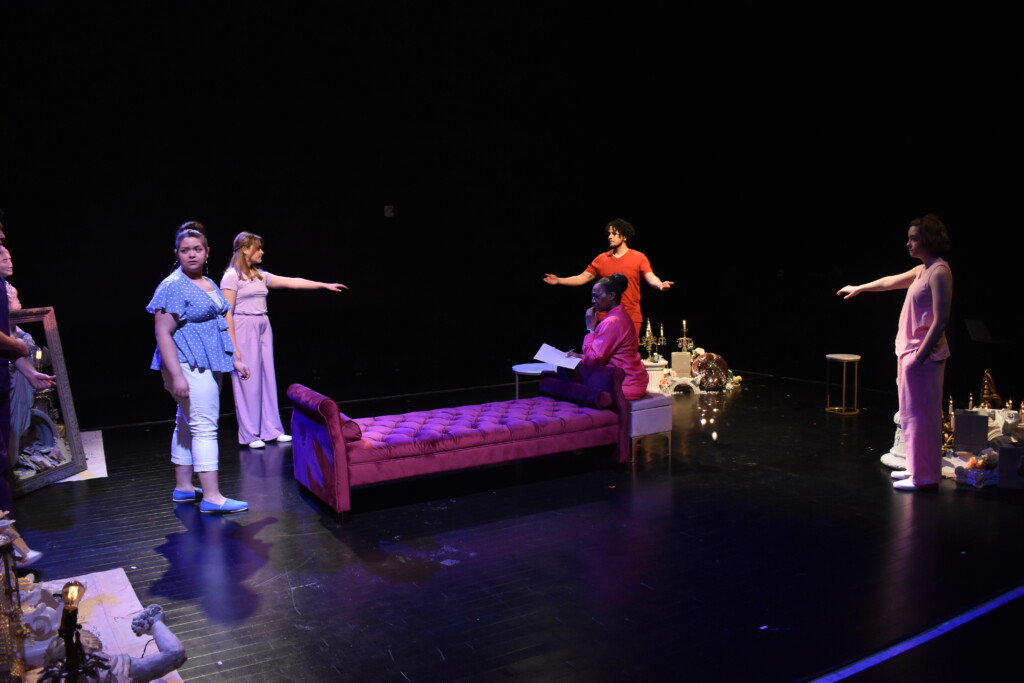
It’s a question that Teah really never answers. She talks extensively about the pandemic and earthquake and the panic she felt with each aftershock. Finally, she says, “If we don’t connect with others, we can easily forget that feeling. I think we tuck it away because we are afraid to feel the pain it can cause when we are hurting.”
For most of the play, Teah has been in a dream. She was on her way to see her therapist when one of the aftershocks hit. It is at that point early in the play when Teah is a bit confused before realizing she is a contestant in a reality dating show with her therapist as the host. But, in her dream. Teah never really finds out if the case she has made will be strong enough to earn a slot for the next episode of this imaginary television show The Bachelor’s Matchmaker.
Salazar rightly leaves the play’s ending open to contemplation and discussion, in a solid premiere production by Plan-B Theatre, which continues with in-person performances through April 17 at the Studio Theatre in the Rose Wagner Center for Performing Arts. There also is a streaming video on demand option, with a purchase, also available through April 17.
Directed by Cheryl Ann Cluff, the play is more like a two-hander script, even though a variety of bit character roles, which are nicely handled by four other cast members, pop up periodically. Estephani Cerros, a recent Weber State University graduate, is Teah, in her debut performance with Plan-B Theatre. Yolanda Stange returns to the Plan-B stage, this time as Dr. Love Dearest. Teah dominates the script and while the therapist’s lines are comparatively sparser, it is those queries that become crucial in trying to grasp all of the stories Teah shares with her and with the audience.
The play, which Salazar wrote during the pandemic and with the long series of aftershocks that persisted after the March 2020 earthquake in Salt Lake City, encapsulates with a lot of good representative detail the experiences, challenges, disappointments, desires, and frustrations for single LDS women.

But, as integral as the aftershock is to coalescing Salazar’s intentions, it really is the ticking beat of the metronome, which rises to symbolic prominence late in the play. At 44, Teah is celibate and is about to reach the age threshold where she can no longer participate in the singles’ group sponsored by her church. She says that she is not bothered by being alone but when Dr. Love Dearest asks her about if she ever feels lonely, she prefers not to answer directly. Teah eventually says, “Love. Relationships. Connections. Life. It feels like an earthquake with aftershock after aftershock – traumatic, distressful events throughout a lifetime.”
While most of the play is Teah’s dream, the realities are embedded in Salazar’s astute writing. Among LDS women, the median age for marriage is 22 and consider that Teah is 44. Earlier this month, church leaders at the semi-annual LDS conference reinforced their message about marrying as early as possible. And, for single women, such as Teah, the message can sting deeply, especially when they remain committed to their faith and identity as a LDS member. She has not completely given up on the ideal of a soulmate. Some of her single sisters in the church community might relent and marry outside of their faith. But, the question remains, what happens to Teah at the age of 45 and beyond? As a non-LDS resident in Utah, one slowly recognizes just how much the socialization and community identity of Teah and other single LDS adults are tied to maintaining a belief-influenced community. LDS marriage is not simply the union of two members who are of the opposite sex and are temple worthy. It is a spiritual endogamous commitment and dating properly requires the individuals to live according to the guidelines and covenants of their faith. While failing to marry does not necessarily preclude an LDS member from participating in their belief-driven community, the unwillingness to value marriage could complicate things for members.
In the imaginary dating show, Dr. Love Dearest tells Teah, “this is a fantastic way for you to be more outgoing, more adventurous! I know you want to be more adventurous.” But, Teah also resists, as she explains in her chronicles of disappointments, adding that she still abides by the strict guidelines regarding sexual behavior in her faith. The doctor responds, “Celibate to the death, not the norm outside of religion. I can imagine there is a lot of shame and feelings of guilt that the single adults in your age group must deal with. Hmmm.” Teah will remain a member of her faith community. But, she also is clearly struggling to find the best path to navigate and follow her church’s cultural expectations in this new phase of her life. Teah appears to still believe in the ultimate gifts of exaltation and salvation, which come to those who live by the church’s teachings.
Cerros’ performance is admirable as she tries to capture as many details of a character who is 20 years older than the actor. Stange is excellent, pulling forth all of the dimensions from a compact portion of lines assigned to her role. The bit performances also are good as well, from Danny Borba, Pedro Flores, Liza Shoell and Sam Torres.
For more information about ticketing, streaming and COVID-19 safety policies, see the Plan-B Theatre website.

